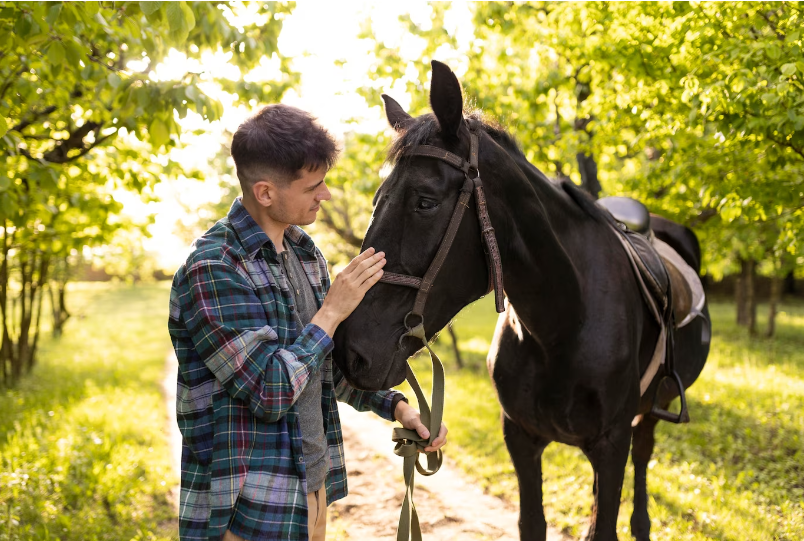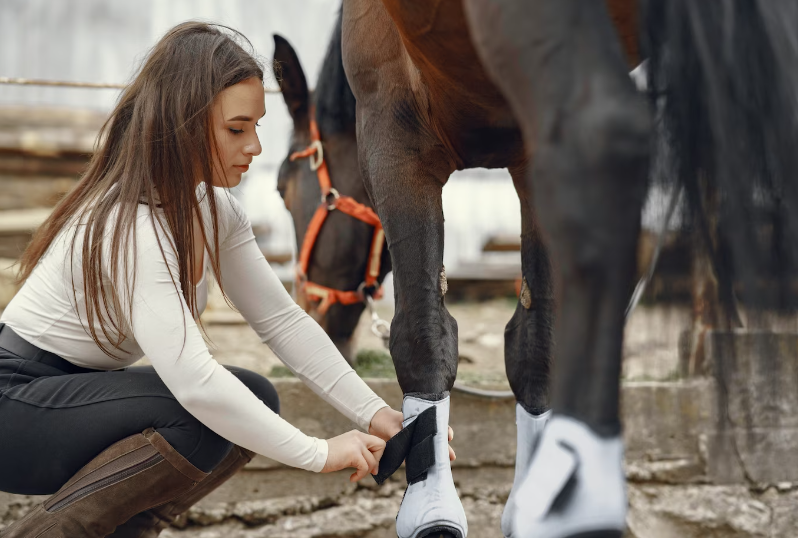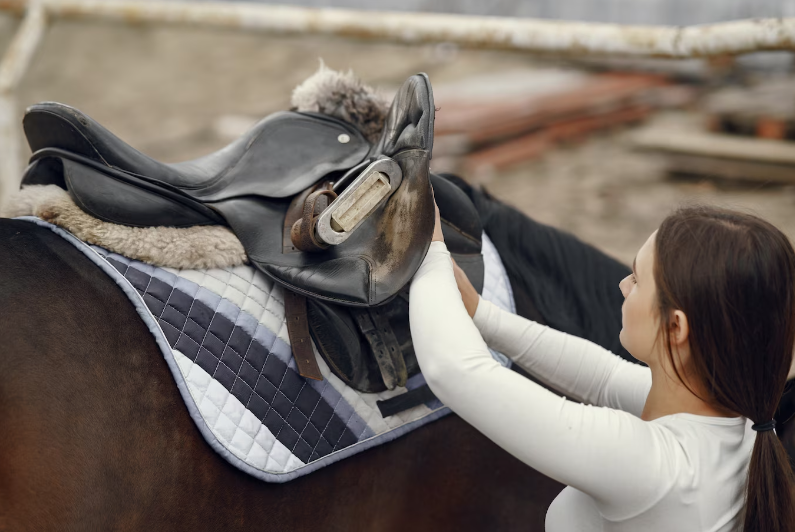A Horse’s Social Circle: The Importance of Companionship in Equine Life
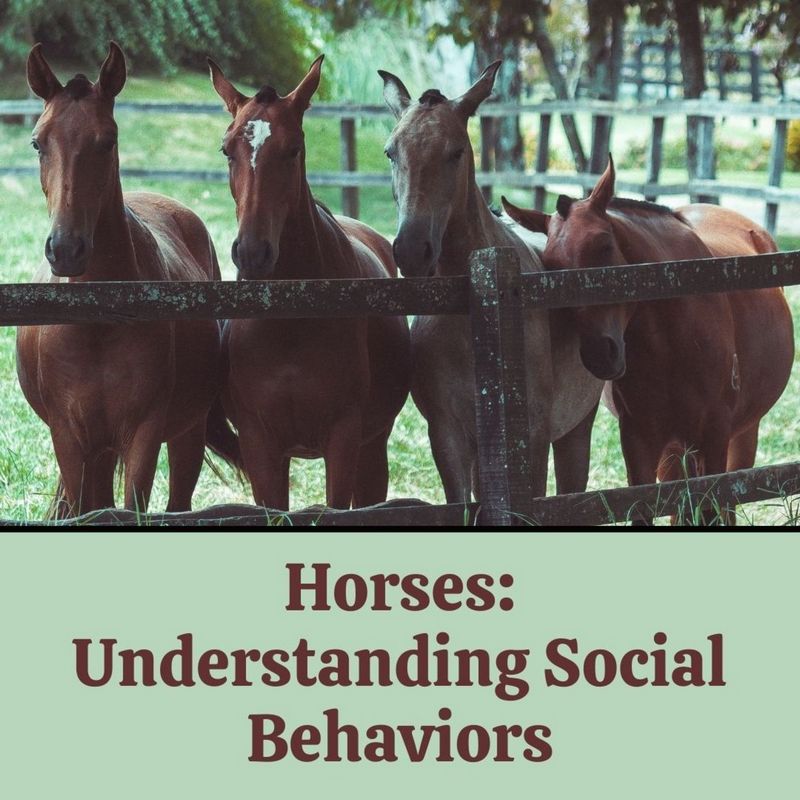
In the equine world, companionship plays a vital role in the well-being and overall development of horses. Horses are highly social animals, and living in a herd or social circle is crucial for their emotional, mental, and physical health. Companionship is not just a luxury for horses; it is a necessity.
Within a horse’s social circle, bonds are formed, hierarchies are established, and communication is key. Horses learn important social skills by interacting with other members of their herd. They develop the ability to read body language, understand social cues, and communicate their own needs.
Companionship also provides horses with a sense of security and comfort. Being part of a social circle reduces stress and anxiety, as horses naturally feel safer in numbers. Additionally, herd dynamics and interactions help horses develop trust and confidence, which is essential for their overall well-being.
Moreover, companionship plays a significant role in the physical health of horses. Horses in a social circle engage in more physical activity, such as playing and running together. This promotes healthy exercise and prevents boredom and behavioral issues that can arise from isolation. Furthermore, horses in a herd have a natural grooming behavior, where they scratch each other’s backs and remove parasites. This grooming behavior helps maintain their coat and skin health.
In conclusion, companionship is of utmost importance in a horse’s life. It provides emotional support, helps develop social skills, reduces stress, and enhances physical health. Like humans, horses need the company of their peers to live a fulfilling and balanced life. As caretakers of these magnificent creatures, it is our responsibility to ensure that they have the opportunity to form and maintain strong social bonds within their equine social circle.
Content:
The Role of Companionship in Equine Well-being
Companionship plays a crucial role in a horse’s social life, emphasizing the importance of social interactions for their overall well-being. Horses are social animals by nature, and their need for companionship cannot be overstated.
Equine life revolves around social relationships, as horses live in herds or groups in their natural environment. In these groups, horses establish strong bonds and form social hierarchies. They engage in various social behaviors, such as grooming, playing, and communicating through body language.
The presence of companionship has a significant impact on a horse’s mental and emotional health. When horses are kept alone or isolated, they may experience stress, anxiety, and exhibit behaviors such as cribbing, weaving, or aggression. These behaviors can be a result of loneliness and a lack of social interaction.
Having a companion helps reduce these negative behaviors and promotes a sense of security and comfort for the horse. It provides them with social stimulation, allowing them to engage in natural social behaviors and form meaningful relationships. Companionship also helps reduce the risk of boredom and provides mental stimulation, resulting in a healthier and happier horse.
In addition to their emotional well-being, companionship also plays a role in a horse’s physical well-being. Horses in groups tend to be more active and engage in more exercise compared to those kept alone. This increased activity level helps maintain their physical fitness and prevents them from becoming overweight or developing behavioral issues.
In conclusion, the importance of companionship in a horse’s life cannot be underestimated. It is essential for their social, emotional, and physical well-being. Whether it be bonding with a herd or having a trusted companion, horses thrive when they have the opportunity to form meaningful social relationships. Providing companionship is a fundamental aspect of responsible equine care and should be prioritized for the overall welfare of horses.
Benefits of Social Interaction for Horses
A horse’s social circle is an important aspect of their equine life. Companionship and social interaction play a crucial role in the well-being and overall happiness of horses.
One of the main benefits of social interaction for horses is the opportunity for companionship. Horses are herd animals by nature and thrive in the presence of others. Being part of a social group allows horses to establish bonds, develop trust, and communicate with each other through various body signals and vocalizations.
Furthermore, social interaction provides horses with mental stimulation and emotional support. Just like humans, horses can experience feelings of loneliness and boredom if they are kept in isolation. Socializing with other horses keeps them engaged and entertained, preventing behavioral issues that may arise from these negative emotions.
In a social setting, horses also learn valuable life skills and behaviors. They observe and mimic the actions of their peers, which helps them develop proper socialization skills and learn from each other. They also establish hierarchies within the herd, teaching them important lessons about respect, sharing resources, and resolving conflicts.
In addition, social interaction contributes to the physical well-being of horses. Horses are naturally inclined to move and graze together, which encourages physical activity and a healthier lifestyle. They can engage in play, grooming, and mutual protection, promoting overall fitness and reducing stress.
In summary, the importance of social interaction for horses cannot be overstated. It provides them with companionship, mental stimulation, emotional support, and valuable life skills. Whether in a domestic or wild setting, horses thrive when they have the opportunity to engage and interact with their social peers.
The Impact of Companionship on Horse Behavior
The social circle of a horse’s equine life is crucial for their overall well-being and behavior. Companionship plays a vital role in shaping a horse’s behavior and can have a significant impact on their emotional and mental state.
Horses are inherently social animals and form strong social bonds within their herd. Being herd animals, horses rely on their companions for safety, security, and social interaction. When a horse is isolated or lacks companionship, they can become stressed, anxious, or exhibit abnormal behaviors.
Companionship with other horses provides horses with a sense of belonging and purpose. It helps to reduce stress and anxiety by providing them with a familiar and safe environment. Horses that have companions can engage in mutual grooming, play, and a variety of social behaviors that are essential for their mental and emotional well-being.
Moreover, companionship with other horses allows horses to learn and develop important social skills. They observe and mimic the behaviors of their companions, which helps them understand social cues and establish their place within the herd hierarchy. This learning process is essential for the development of a horse’s social and communication skills.
Companionship also has a positive impact on a horse’s physical health. Horses that have companions are more likely to engage in regular exercise and movement, as they are motivated to interact and play with their companions. This increased activity helps to keep their muscles and joints healthy, leading to improved overall physical condition.
In conclusion, the impact of companionship on horse behavior is significant. Companionship provides horses with a sense of belonging, reduces stress and anxiety, develops social skills, and improves physical health. It is essential for horse owners and caregivers to consider the social needs of horses and ensure that they have appropriate companionship to support their well-being and overall behavior.
Equine Relationships: Hierarchy and Bonding
In the horse’s social circle, companionship plays a vital role in their lives. Horses are social animals, and the importance of social interactions cannot be overstated. It is through these relationships that horses establish their hierarchy and form strong bonds with each other.
| Hierarchy | Bonding |
| Horses naturally establish a social hierarchy within their group. This hierarchy is based on dominance and submission, with each horse having a specific rank. The highest-ranking horse, also known as the alpha, is the leader of the group and is granted certain privileges. | Bonds between horses are formed through mutual grooming, play, and shared experiences. These bonds are often seen between horses that spend a significant amount of time together, such as siblings or lifelong partners. |
| The hierarchy helps to maintain order and stability within the group. It allows horses to establish clear roles and responsibilities, reducing the potential for conflict. Horses lower in the hierarchy show respect and deference to those higher in rank. | Bonded horses often exhibit behaviors such as mutual grooming, leaning on each other for support, and remaining close in proximity. These behaviors strengthen their emotional connection and provide a sense of security and companionship. |
| Horses lower in the hierarchy may also form alliances and friendships to navigate the social dynamics. These friendships can serve as a source of support and protection within the group. | Strong bonds between horses promote their overall well-being and can help reduce stress and anxiety. They provide horses with a sense of belonging and comfort, enhancing their physical and mental health. |
In conclusion, equine relationships are crucial for horses’ social and emotional well-being. The establishment of hierarchy and the formation of strong bonds contribute to their overall happiness, making companionship an essential aspect of a horse’s life.
Natural Herd Dynamics and Horse Socialization
In the equine world, social interaction plays a crucial role in a horse’s life. Horses are naturally social animals and form strong bonds within their herd. Understanding the principles of natural herd dynamics and horse socialization is essential for providing a healthy and enriching environment for our equine companions.
Horses are herd animals and thrive in a social setting. In the wild, they live in herds consisting of multiple mares, a dominant stallion, and their offspring. This herd structure provides safety, companionship, and allows for the development of important social skills.
Within the herd, horses establish a social hierarchy, with the dominant stallion leading the group. Other horses within the herd have specific roles and positions, which are determined through a variety of factors such as age, strength, and social skills. This hierarchical structure helps maintain order and minimizes conflicts within the group.
Socialization among horses is not only important for their mental well-being but also their physical health. Interacting with other horses allows them to engage in natural behaviors such as grooming, playing, and grazing together. These activities contribute to their overall happiness and help reduce stress and boredom.
Companionship within the horse’s social circle is particularly important during times of stress or change. Horses rely on each other for emotional support and comfort. When faced with challenges or unfamiliar situations, having a trusted companion by their side can help them feel more secure and confident.
When horses are kept in isolation or without adequate opportunities for socialization, they can experience negative effects on their mental and physical well-being. They may become anxious, depressed, or develop behavioral problems. Therefore, it is essential for horse owners to understand the significance of providing adequate socialization opportunities for their equine partners.
In conclusion, natural herd dynamics and horse socialization are crucial aspects of a horse’s life. The equine social structure allows for the development of important social skills, provides companionship, and contributes to their overall well-being. As responsible horse owners, we must prioritize the social needs of our equine companions to ensure they live happy, healthy lives.
The Psychological Benefits of Horse Companionship
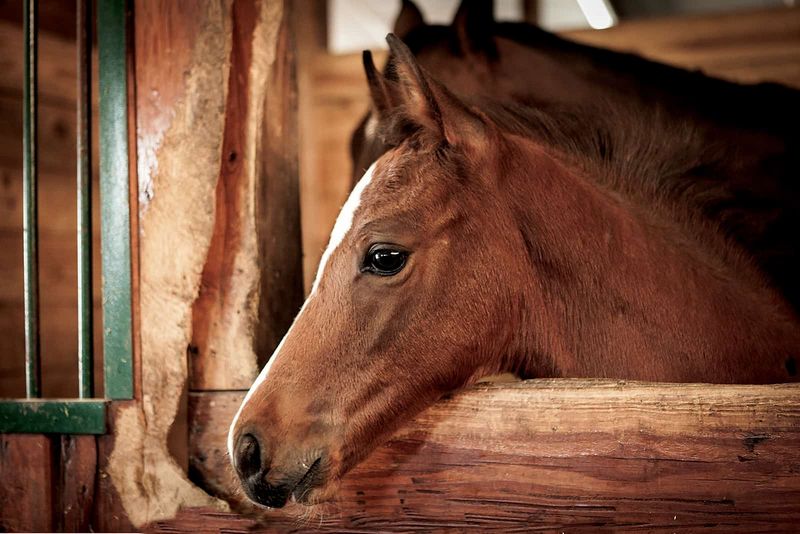
Companionship is of utmost importance in equine life. Horses, being social animals, thrive in a circle of companions. Companionship provides a sense of connection and belonging, which is vital for their psychological well-being.
One of the key benefits of horse companionship is the reduction of stress and anxiety. When horses have a companion, they feel more secure and less vulnerable to external threats. They can rely on their companion for support and reassurance in challenging situations.
Horse companionship also promotes mental stimulation. Horses are intelligent animals that need mental engagement to prevent boredom and its negative consequences. Interacting with a companion provides opportunities for social interaction, play, and learning, which contribute to their overall mental well-being.
Furthermore, horse companionship helps to develop and enhance social skills. Horses, like humans, have their own social dynamics and hierarchies. Interacting with a companion allows horses to learn and understand these social cues, which is essential for their social development and integration within the equine community.
In addition, horse companionship can have a positive impact on horses’ emotional state. Having a companion to share experiences and emotions with helps horses feel a sense of belonging and fulfillment. This can result in improved mood and a greater overall sense of happiness and contentment.
In conclusion, the psychological benefits of horse companionship cannot be underestimated. It plays a crucial role in a horse’s life, providing them with a sense of connection, reducing stress, promoting mental stimulation, enhancing social skills, and improving emotional well-being. Investing in horse companionship is not only beneficial for the individual horse but also contributes to the overall health and happiness of the equine community as a whole.
Companionship and Mental Stimulation for Horses
Social interactions are an essential part of any equine life, emphasizing the significance of companionship in a horse’s social circle. As herd animals, horses naturally seek companionship and engage in various social behaviors that contribute to their overall well-being. These interactions provide mental stimulation, helping to keep horses happy and healthy.
Companionship plays a crucial role in a horse’s life, as it allows them to form strong social bonds, establish hierarchies, and learn valuable communication skills. Horses thrive when in the presence of others, and the absence of companionship can lead to feelings of loneliness and stress. The companionship of other horses helps provide a sense of security and belonging.
In the wild, horses typically live in herds, where they rely on each other for protection, foraging, and even grooming. These social interactions provide mental stimulation, keeping horses engaged and mentally active. Just like humans, horses need mental stimulation to prevent boredom and promote a healthy mind.
When horses are deprived of companionship and mental stimulation, they may develop behavioral issues, such as excessive cribbing, weaving, or aggressive behavior. These behaviors can indicate a lack of social interaction and mental stimulation, displaying the importance of companionship for a horse’s overall well-being.
Providing horses with companionship and opportunities for social interactions is crucial for their mental health and overall happiness. Whether through turnout with other horses, creating a buddy system, or participating in activities that encourage socialization, it is essential to prioritize companionship as a fundamental aspect of equine care. By doing so, horse owners can ensure their animals live fulfilling, socially enriched lives.
The Emotional Support of Equine Companions
Equine companionship plays a crucial role in a horse’s life, providing them with social interaction and emotional support. Horses are herd animals by nature, and they thrive when they have the companionship of other horses.
The social dynamics within a horse’s herd are complex and essential to their well-being. Through social interactions, horses establish hierarchies, develop bonds, and learn important life skills. Equine companionship helps to fulfill their need for socialization and provides them with emotional support.
Horses form strong bonds with their companions and rely on them for comfort and companionship. When horses experience stress or fear, having a trusted equine friend by their side can help to alleviate their anxiety and provide emotional support. Equine companions can offer a sense of security and reassurance to horses in new or challenging situations.
Equine companionship also plays a role in a horse’s mental and emotional well-being. Horses are highly intelligent and social animals, and without adequate companionship, they may experience loneliness and boredom. These negative emotions can lead to behavioral issues, such as destructive or anxious behaviors.
Furthermore, equine companionship has a positive impact on a horse’s physical health. Horses that are housed alone or without adequate social interaction may experience higher stress levels, increased heart rate, and disrupted sleep patterns. Having equine companions helps to reduce these negative effects on a horse’s health and promotes overall well-being.
In conclusion, the importance of equine companionship cannot be overstated. Horses thrive in social environments and rely on the emotional support of their companions. Providing horses with adequate social interaction and the opportunity to form bonds with other horses is essential for their overall health and well-being.
Companionship and Stress Reduction in Horses
Companionship is of utmost importance in a horse’s social circle and plays a crucial role in their overall well-being. Horses are herd animals by nature and thrive in the presence of others. The companionship of other horses not only provides them with a sense of security but also helps them form meaningful relationships.
One significant benefit of companionship for horses is stress reduction. Horses are highly sensitive animals and can easily get stressed or anxious when placed in solitary situations. However, when they have companions around, they feel more at ease and are better able to manage stress. The presence of a companion horse can help reduce feelings of isolation and loneliness, which in turn can alleviate stress levels.
Companionship also helps horses cope with environmental stressors. Whether it’s loud noises, unfamiliar surroundings, or changes in routine, horses tend to feel more secure and less apprehensive when they have trusted companions by their side. They can rely on their companions for emotional support, which can buffer the impact of stressors and help them navigate through challenging situations.
In addition to reducing stress levels, companionship contributes to the overall mental well-being of horses. It provides them with opportunities for social interaction, engagement, and play, thus enhancing their quality of life. Horses in a social group can engage in mutual grooming, play games, and exhibit natural herd behaviors. These social interactions not only fulfill their innate social needs but also contribute to their mental stimulation and overall happiness.
Moreover, companionship has been found to have a positive impact on the physical health of horses. When horses have companions, they tend to be more active and engaged, which can help improve their cardiovascular health, maintain appropriate weight, and prevent certain health issues associated with prolonged inactivity.
In conclusion, companionship is essential in a horse’s life, and it significantly contributes to their stress reduction and overall well-being. Through companionship, horses can find comfort, security, and happiness. Therefore, providing horses with suitable companionship is vital for ensuring their physical, mental, and emotional health.
Health Benefits of Socialization for Horses
Horses are social animals that thrive in the company of their own kind. Socialization is an essential aspect of their life, providing numerous health benefits for these magnificent creatures.
Companionship and interaction with their fellow equines contribute to a horse’s overall well-being. In a social circle, horses have the opportunity to form strong bonds, establish hierarchies, and engage in various social behaviors that are crucial for their mental and emotional health.
Regular socialization helps reduce stress and anxiety in horses. It provides them with an outlet for their natural instincts and decreases the likelihood of developing behavioral issues such as cribbing or weaving. Horses that are well-socialized are generally happier and more content.
Physical health is also greatly influenced by socialization. Horses that live in a social environment are more likely to engage in regular exercise, as they are encouraged to move around and interact with their companions. This increased activity helps improve cardiovascular health, muscle tone, and overall fitness.
Socialization also contributes to a horse’s cognitive development. Interacting with other horses stimulates their minds, promotes problem-solving skills, and enhances their ability to communicate effectively. These mental exercises lead to increased intelligence and a sharper sense of awareness.
Additionally, socialization plays a vital role in the socialization of young horses. Foals learn essential social and survival skills by observing and interacting with their mothers and other members of the herd. This early socialization sets the foundation for their future social behavior and overall development.
In conclusion, socialization is of utmost importance in the equine world. It not only promotes a horse’s mental and emotional well-being but also contributes to their physical health and cognitive development. Providing horses with opportunities for social interaction and companionship is vital for their overall happiness and quality of life.
Effects of Isolation on Equine Health and Well-being
In the life of a horse, social interaction and companionship are essential components of their well-being. Horses are herd animals by nature, and their social circle plays a crucial role in their overall health and happiness. Isolation from their equine companions can have significant negative effects on horses, both physically and mentally.
The horse’s social circle provides them with a sense of belonging and security. Being part of a herd offers companionship, protection, and the opportunity for social interaction. When horses are isolated, they are denied the opportunity to engage in natural herd dynamics, which can result in increased stress levels and feelings of loneliness and anxiety.
Isolation can also have detrimental effects on a horse’s physical health. Horses are highly sensitive creatures and thrive on routine and familiar surroundings. When isolated, they may experience decreased physical activity, leading to weight gain, muscle loss, and even joint and cardiovascular problems. Additionally, the lack of social interaction may contribute to a weakened immune system, making horses more susceptible to illnesses and diseases.
Furthermore, the absence of companionship can lead to behavioral issues in horses. Without the guidance and social structure provided by a herd, horses may become bored, restless, and exhibit destructive behaviors. This can include cribbing, weaving, and aggressive tendencies, as they seek to cope with the stress and frustration of isolation.
Overall, isolation from their equine companions can have profound negative effects on a horse’s health and well-being. To promote the welfare of horses, it is essential to provide them with opportunities for social interaction and companionship. Whether through turnout with compatible herd members or regular visits from other horses, creating a fulfilling social circle for horses is crucial for their overall health and happiness.
The Role of Companionship in Training and Performance
In the equine world, companionship plays a crucial role in the training and performance of horses. Horses are highly social animals that naturally form strong bonds with others in their social circle. These social connections are not only important for their overall well-being and quality of life, but also have a significant impact on their ability to learn and perform to their full potential.
Companionship provides horses with a sense of security and comfort, creating an environment where they feel safe and relaxed. When horses are in the presence of their trusted companions, they are more likely to be focused, responsive, and engaged during training sessions. This emotional connection fosters a positive learning environment, allowing horses to better understand and respond to their trainers’ cues and signals.
In addition to the emotional benefits, companionship also plays a practical role in the training and performance of horses. When horses are paired with compatible companions, they can engage in natural social behaviors such as play, grooming, and mutual protection. These interactions promote physical and mental well-being, improving their overall fitness and performance.
Furthermore, companionship can help alleviate stress and anxiety in horses, which can hinder their ability to learn and perform effectively. The presence of a trusted companion can act as a source of reassurance, providing horses with the confidence they need to face new situations and challenges. This is especially important in competitive settings, where horses are often exposed to high-pressure environments and unfamiliar surroundings.
Overall, the importance of companionship in the training and performance of horses cannot be underestimated. It not only enhances their emotional well-being, but also improves their focus, responsiveness, and overall performance. Whether it is a pasture mate, a stable buddy, or a companion during training sessions, having a social connection is essential for a horse’s physical and mental development.
Question-answer:
Why is companionship important for horses?
Companionship is important for horses because they are social animals who thrive on the presence of others. Being herd animals, horses feel secure and happy when they have company. They rely on social interaction to fulfill their emotional and psychological needs.
What are the benefits of companionship for horses?
Companionship offers several benefits for horses. Firstly, it helps reduce stress and anxiety by providing a sense of security. Secondly, it promotes physical and mental well-being by encouraging exercise and play. Thirdly, it aids in the development of social skills and behavior. Lastly, it can prevent behavioral problems such as aggression or boredom.
Can a lack of companionship affect a horse’s health?
Yes, a lack of companionship can have negative effects on a horse’s health. Loneliness and isolation can lead to stress, depression, and even physical ailments. Horses may become more susceptible to illness or develop behavioral issues due to the absence of social interaction. It is important to ensure that horses have appropriate companionship to maintain their well-being.
What are some suitable companions for horses?
Horses can form companionships with various animals. Other horses are the most natural companions, as they share similar social behaviors and communication patterns. However, horses can also bond with other equines such as ponies or donkeys. Other animals like goats or cows can also serve as suitable companions, as long as they are compatible and have adequate space for interaction.
How can horse owners provide companionship for their horses?
Horse owners can provide companionship for their horses by keeping them in groups or pairs whenever possible. It is essential to ensure that horses have enough space for comfortable social interaction. If it is not possible to keep multiple horses, alternative options such as providing a companion animal or allowing regular turnout with other horses can be considered. Regular socialization and interaction with other horses or animals are vital for a horse’s overall well-being.
